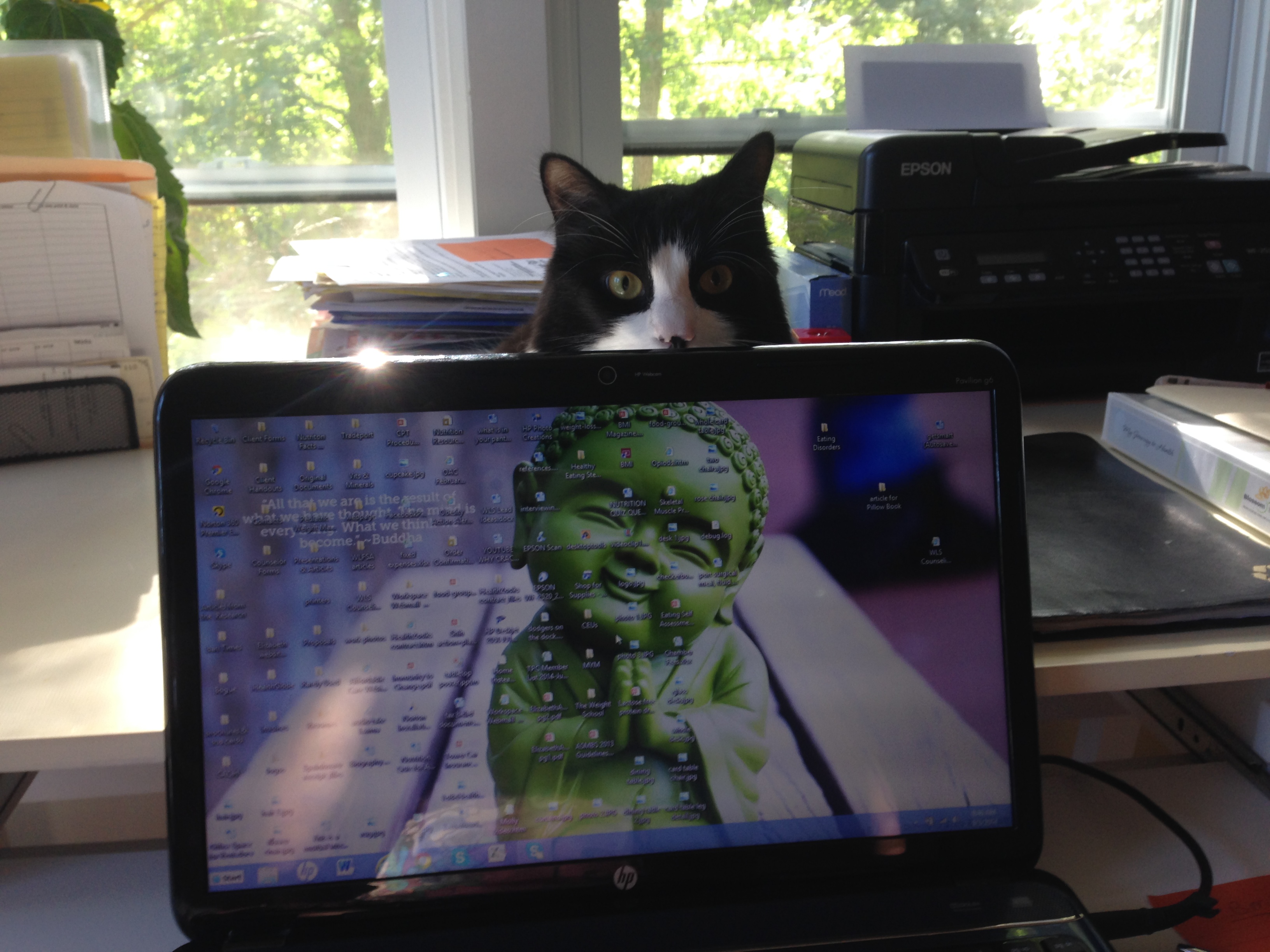The Brain Drain: Are You Your Own Worst Enemy?

Shari* is one of my clients. She’s six months out from wls. She’s lost 55 lbs. and has hit her first significant roadblock.
“I’m a failure. I went back to sugar. I’m an addict. I’ll never be able to stop. I know I’m going to regain all the weight I’ve lost. I can’t believe this [surgery] didn’t work for me.”
Sound familiar?
As a bariatric dietitian I hear these worries every day. Totally disheartened clients are confident they cannot maintain their post op weight loss, that the honeymoon is over and their bad luck/life-long battle with weight has returned.
When I tell them their own abusive thoughts are doing more damage than the donuts they’re eating, they’re shocked.
I’m not making this stuff up people. Research continues to show over and over that cognitive structuring or what we think about what we eat, who we are and what we’re capable of is one of the most crucial factors in weight management.
I’m reading Ph.D. therapist, Joyce Nash’s fabulous book “Now That You’ve Lost It, How to Maintain Your Best Weight.” Nash shares research identifying thought patterns in those who struggle with obesity.
Here are some examples:
Obese thoughts: ”Why do I have to work so hard at this when other people get to eat whatever they want and not gain weight?”….”I guess I’m just meant to be fat.”…..”I shouldn’t feel angry.”…..”If I don’t do it, no one else will.”
Researchers summarize those not very successful at long-term weight loss tend to…”not want to set limits, doubt their ability to change, reject the right to speak up for their needs, avoid interpersonal conflict, set up unrealistic expectations for themselves and judge themselves and others harshly.”
The researchers conclude that weight loss plans cannot have a long-term effect if such beliefs exist because they totally undermine success.
But how in the world can someone turn that frown upside down when they’re in a period of full court press relapse?
Here’s what Nash suggests.
“[The client]…must decide that something is different this time, something has changed. Whereas in the past something was missing, now that ingredient is present. [The client] now understands she must THINK differently and DO things differently to succeed. She must take charge, not only of her behavior but of her thinking.”
If it seems all too happy and Pollyanna-ish, it doesn’t have to be.
With Shari, I helped her reframe how she was thinking about her swings through Dunkin’ Donuts. Shari is struggling with some of those Top 10 Most Stressful Life Events right now and she’s turning to sweets as a reward/treat/distraction. When we devised a plan to reset boundaries, seek grief counseling and think more flexibly about her eating, she was able to regain her footing.
Have your regained some of your weight? Whether it’s 5, 10, 50 pounds or more, the fastest way to stop the runaway train is to do a 180 degree turn in your thinking. We usually can’t do this alone. Find someone from your bariatric team or a supportive counselor or dietitian who can help you see the error possibilities of your beliefs.
*names are changed to protect client identity
It sounds like you've found a sustainable way to coexist in the world with sugar. Congratulations on your continued healthy success!
There are not enough words for how much I needed to hear this right now. I'm sitting at about 10 months post-op and have only lost about 50 pounds and feel JUST LIKE the example lady. Last night I cried in the shower for the overwhelming feelings of failure and disappointment with myself and my choices. (bearing in mind that since my surgery, I changed jobs for the first time in 13+ years, my dad died suddenly, we moved, I had a big work project for the first time ever and am about to deal with another loss in the family most likely sometime this week.) I am reaching out to some other bariatric folks and hoping to find accountability. I'm also working on seeing if my husband and I can find room in the budget for me to join a local gym that offers childcare for a small price - since I will usually be unable to hit the gym without my daughter, I need to use a bit pricier of a place so childcare is offered. Anyway, I'm working on overcoming my thoughts, but it is quite a struggle and this article COMPLETELY resonates with me. THANK YOU for sharing it. <3
Ms. Becky, never, ever forget you are a ROCKSTAR!! Talk about having a few issues on the 10 Biggest Life Stressors list! I'm going to say what you already know, you must take care of yourself FIRST to offer the world a massive dose of love. And, the fastest way to hopelessness and despair is flogging yourself mentally. Self-compassion isn't an excuse, it's a necessity for long-term weight management. xoxxo Elizabeth
@Elizabeth Anderson RD,
Thanks for this great article! It addresses something very important: what happens after the honeymoon when some of the doubts can creep back in?
You have hit on some great points. The questions of “Why me?” and “Why is it easier for everyone else?” can be so destructive. It doesn’t matter why me, and it doesn’t matter whether it’s hard or easy for everyone else (by the way – it’s probably hard for everyone else! – the WLS patient may just may not realize it!). What matters is what you do about it.
You also make a good point about recognizing and believing that this time is different, that this time you have the tools to succeed whereas before you didn’t. Even though this can be hard to remember and feel sometimes, since the journey never actually gets easy, it is true, and we need to believe it and act on it – that we can do this.
Thanks for the article.
Wow this article couldn't have come at a better time for me. I am 6 month post op from a sleeve surgery, gallbladder removal and hernia repair. Have lost 70 pounds since those surgeries. However just this past week I fell again (have very bad back and hips for over 26 years and can't walk without aids.) and my hernia has come back. My weight loss has slowed down, perhaps due to my not having been bike or swimming as much as I should be. Since the fall and hearing about the hernia being back I have fallen into a depression and have said the same things your client did. I need to regain my footing but not sure how to do this. It helps though to know I am not alone and that this happens to others.






James Marusek 5,244
Posted
Sugar is my kryptonite. But fortunately today there are many sweeteners available for my sweet tooth. They include artificial sweeteners such as Splenda and natural low calorie sweeteners such as stevia. Many of these sweeteners are showing up on the product shelves of grocery stores.
So it is a matter of reframing. I avoid processed sugar in all its forms (table sugar, high fructose corn Syrup etc.) but rely on other forms of sweeteners with zero or very low calories. I am 3 years post-op RNY. Before surgery I was on two forms of diabetes medicine to try and control my high blood sugar levels. That ended when I left the hospital two days after surgery. My diabetes has been in remission ever since.
Share this comment
Link to comment
Share on other sites